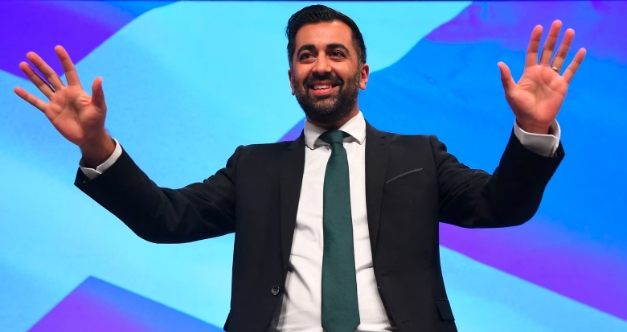The Scottish Government has been accused of betraying the Ukrainian refugees who fled the war and settled in Scotland, after it decided to axe the funding for local councils to support them.
Funding withdrawal sparks outrage
The Scottish Government informed the local authorities just days before Christmas that the funding to help the Ukrainians integrate and access services would not be continued. The decision was met with anger and disappointment by the councils and the refugee communities, who said it would have a devastating impact on their lives.
The funding was part of the Homes For Ukraine scheme, which was launched by the UK Government in March 2022 to offer fast-track visas and resettlement support to the displaced people from Ukraine, who faced the threat of Russian invasion. Scotland welcomed more than 23,000 refugees under the scheme, with the Scottish Government sponsoring most of them.
The Scottish Government claimed that it had spent £120 million on the scheme, and that it was not obliged to provide any further funding beyond the initial 12 months. It also said that it had offered to work with the UK Government and the councils to find a long-term solution.

However, the councils said that they had not received any clear guidance or communication from the Scottish Government, and that they were left in the dark about the future of the scheme. They also said that the funding was crucial to cover the costs of housing, education, health, and social care for the refugees, who faced many challenges and barriers in their new country.
Refugees feel abandoned and betrayed
The funding cut also affected the refugees themselves, who felt that they had been abandoned and betrayed by the Scottish Government. Many of them had left their homes, families, and jobs in Ukraine to seek safety and security in Scotland, only to find themselves struggling to cope with the lack of support and resources.
Some of the refugees said that they had not received any information or advice from the Scottish Government or the councils about their rights, entitlements, and opportunities in Scotland. They also said that they faced difficulties in finding employment, learning English, accessing health care, and integrating into the society.
One of the refugees, Olena, who came to Scotland with her husband and two children, said: “We are very grateful to Scotland for giving us a chance to live here, but we feel like we have been forgotten and ignored. We don’t know what will happen to us next. We don’t have any security or stability. We don’t have any friends or support network. We feel very lonely and isolated.”
Another refugee, Andriy, who came to Scotland with his wife and three children, said: “We left everything behind in Ukraine to escape the war and the violence. We hoped to find a better life in Scotland, but we have been disappointed and disillusioned. We don’t have any money or income. We don’t have any skills or qualifications. We don’t have any prospects or opportunities. We feel very hopeless and helpless.”
Scottish Government defends its decision
The Scottish Government defended its decision to withdraw the funding, saying that it had done more than its fair share to support the Ukrainian refugees, and that it was the responsibility of the UK Government to provide adequate and sustainable funding for the scheme.
The First Minister, Humza Yousaf, said: “Scotland has shown its solidarity and compassion to the Ukrainian refugees, who have suffered unimaginable hardship and trauma. We have welcomed more than 23,000 of them into our communities, and we have provided them with the best possible support and assistance. We have invested £120 million in the Homes For Ukraine scheme, which is more than any other part of the UK. We have also offered to work with the UK Government and the councils to find a long-term solution, but we have not received any positive response or engagement from them. We cannot continue to fund the scheme indefinitely, without any commitment or contribution from the UK Government, who are ultimately responsible for the immigration and asylum policy in the UK.”
He also said that the Scottish Government was committed to helping the refugees to integrate and thrive in Scotland, and that it would continue to provide them with other forms of support and assistance, such as the New Scots strategy, the Scottish Refugee Council, and the Scottish Welfare Fund.
UK Government urges Scottish Government to reconsider
The UK Government urged the Scottish Government to reconsider its decision to cut the funding, saying that it was a joint responsibility to support the Ukrainian refugees, and that it was unfair and unreasonable to expect the UK Government to bear the entire burden.
The Secretary of State for Levelling Up, Housing and Communities, Michael Gove, said: “The UK Government has shown its leadership and generosity to the Ukrainian refugees, who have fled the brutal and illegal aggression of Russia. We have opened a fast-track visa corridor and a resettlement support scheme for them, which have been widely praised and recognised by the international community. We have also provided £500 million to the councils across the UK to help them cover the costs of housing, education, health, and social care for the refugees. We have done our part, and we expect the Scottish Government to do theirs. We urge them to reconsider their decision to withdraw the funding, which is a betrayal of the refugees and a breach of the agreement. We also urge them to work with us and the councils to find a long-term solution, which is in the best interests of the refugees and the taxpayers.”
He also said that the UK Government was committed to protecting the sovereignty and territorial integrity of Ukraine, and that it would continue to support the Ukrainian people and government in their fight against the Russian invasion.


















